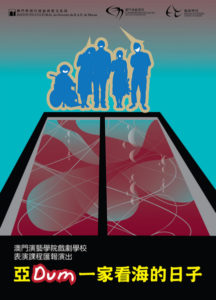A Home with a View
家和万事惊
Hong Kong/China, 2019, colour, 2.35:1, 91 mins.
Director: Qiu Litao 邱礼涛 [Herman Yau].
Rating: 7/10.
Modern spin on the Hong Kong tenement comedy boasts a quality cast and script, with fine ensemble.
Hong Kong, the present day. Three generations of the Lu family live together in an average, cramped Hong Kong flat: calm father Lu Weiwen (Wu Zhenyu), who rents out subdivided flats; hot-tempered wife Li Shuxian (Yuan Yongyi); layabout, wannabe musician son Lu Benkang (Wu Zhaoxuan); self-obsessed teenage daughter Lu Rushi (Cai Songsi); and Lu Weiwen’s wheelchair-bound father (Zhang Daming). Constantly arguing among themselves over saving money, and with noisy (Lin Xue) or anti-social (Lu Haipeng) neighbours, they all find peace and solace in the tiny view of the sea – actually just a bit of Hong Kong harbour – from their living-room window. One evening, during yet another row, they all see  an advertisement hoarding being erected on the roof across the street, blocking their treasured view. They try to get help from a bureaucrat friend, Zhang (Huang Qiusheng), but the hoarding’s owner and creator, Wang Xiaocai (Gu Tianle), who lives in the building’s roof terrace flat, is blithely unconcerned, claiming it’s a personal artistic creation. The family tries to get up a petition against the hoarding but this proves ineffectual in the face of the territory’s bureaucracy. Insultingly, Wang Xiaocai offers to pay Lu Weiwen HK$500 a month in “landscape view compensation”. Furious, the family challenges Wang Xiaocai’s contention that the hoarding is an artistic work, but the public meeting breaks up in chaos. Adopting a more conciliatory approach, the family tries to teach Wang Xiaocai what good neighbourliness actually means. Initially the tactic seems to work, as Wang Xiaocai unburdens his own problems, but then events escalate out of control.
an advertisement hoarding being erected on the roof across the street, blocking their treasured view. They try to get help from a bureaucrat friend, Zhang (Huang Qiusheng), but the hoarding’s owner and creator, Wang Xiaocai (Gu Tianle), who lives in the building’s roof terrace flat, is blithely unconcerned, claiming it’s a personal artistic creation. The family tries to get up a petition against the hoarding but this proves ineffectual in the face of the territory’s bureaucracy. Insultingly, Wang Xiaocai offers to pay Lu Weiwen HK$500 a month in “landscape view compensation”. Furious, the family challenges Wang Xiaocai’s contention that the hoarding is an artistic work, but the public meeting breaks up in chaos. Adopting a more conciliatory approach, the family tries to teach Wang Xiaocai what good neighbourliness actually means. Initially the tactic seems to work, as Wang Xiaocai unburdens his own problems, but then events escalate out of control.
REVIEW
A Hong Kong family becomes obsessed by a hoarding that’s blocked its sight of the sea in A Home with a View 家和万事惊, a busy black comedy that takes shots at the territory’s cramped living conditions, over-priced property market, labyrinthine bureaucracy and general obsession with money. Smartly adapted by local actor-writer Zhang Daming 张达明 from his own 1993 play, it’s also the best and most focused non-action movie by prolific director Qiu Litao 邱礼涛 [Herman Yau] for many years, with terrific ensemble playing by a largely veteran cast, character-driven drama that’s driven by copious but engaging dialogue, and expert calibration towards its darker final act. Local box office was negligible, and it hardly performed on the Mainland any better (RMB33 million), but that in no way detracts from its qualities. What could have been just another shouty Hong Kong comedy ends up as much more, without forgetting its entertainment values.
The film is basically a modern entry in the Hong Kong tenement genre that’s been a staple of the territory’s cinema for the past 70 years. In this case, a family of five (two parents, two children, plus a disabled grandfather) take umbrage against an ad hoarding that’s erected across the street, on the basis that it robs them of their one joy in life – a view of the sea. That it’s actually just a tiny sliver of Hong Kong’s harbour, not a real seascape, is the principal irony – neatly underscored in the film’s closing shot – and their obsession says more about their own limited outlook on life than anything else. Troublesome, noisy neighbours – upstairs, downstairs, opposite – don’t help, but the three-generation family itself is also highly dysfunctional, perpetually spatting over money, self-obsession and status. So far, then, nothing new for a Hong Kong urban comedy, but Home rises above the norm with its well-structured script and quality production.
 As well as playing the grandfather role in heavy makeup, Zhang has cleverly adapted his own play – 亚Dum一家看海的日子 (literally, “An Idiot Family’s Life Looking at the Sea”) – in a way that doesn’t deny its stage origins (a big chunk is still set in the flat) but opens it out in a natural way. In the play (see poster, left, for a 2013 Macau production), the irritation was another rooftop flat; in the film it’s a giant, gaudy billboard advertising beer. Despite, too, the plethora of supporting roles and cameos by well-known names – Lin Xue 林雪 [Lam Suet] as a butcher neighbour, Lu Haipeng 卢海鹏 as a smoking one, Yuan Qiongdan 苑琼丹 as a school counseller, and so on – the focus still remains on the family quintet, with the unstated message that it needs to sort out its own problems before taking on its neighbours.
As well as playing the grandfather role in heavy makeup, Zhang has cleverly adapted his own play – 亚Dum一家看海的日子 (literally, “An Idiot Family’s Life Looking at the Sea”) – in a way that doesn’t deny its stage origins (a big chunk is still set in the flat) but opens it out in a natural way. In the play (see poster, left, for a 2013 Macau production), the irritation was another rooftop flat; in the film it’s a giant, gaudy billboard advertising beer. Despite, too, the plethora of supporting roles and cameos by well-known names – Lin Xue 林雪 [Lam Suet] as a butcher neighbour, Lu Haipeng 卢海鹏 as a smoking one, Yuan Qiongdan 苑琼丹 as a school counseller, and so on – the focus still remains on the family quintet, with the unstated message that it needs to sort out its own problems before taking on its neighbours.
As the calm but money-obsessed father (who makes a living out of renting subdivided flats way smaller than his own), Wu Zhenyu 吴镇宇 [Francis Ng] more than rises to the challenge of the film’s key role as he mediates between a hot-headed wife (Yuan Yongyi 袁咏仪 [Anita Yuen] in a welcome substantial role), self-absorbed millenial kids, dotty grandfather, rude neighbours and Hong Kong’s ingrown government bureaucracy. Nice, too, to see fellow veteran Huang Qiusheng 黄秋生 [Anthony Wong] – now virtually blacklisted by the mainstream industry – as a spacey bureaucrat friend who proves as hollow as his government-speak. The big surprise, however, is the range shown by the often wooden Gu Tianle 古天乐 [Louis Koo], here playing the offending party who seems blithely untroubled by the family’s protestations but is later revealed to have deep-seated problems of his own.
Despite its trim, 90-minute running time, expertly tailored by experienced editor Zhong Weizhao 钟炜钊 [Azrael Chung], every main character is well detailed, including the younger ones: a very funny sequence about how the teenage daughter helped a classmate to give birth in the school toilet, and the layabout son’s hopeless attemps to become a songwriter. The heavy lifting, however, is done by Wu, Yuan and Gu as the husband, wife and troublemaker, with a sense of professional familiarity and ensemble that’s tangible.
Arguably more could have been made in the early stages of the poetic, restorative powers of the “view”, and there’s a slight dip in momentum around the hour mark before the film reinvents itself for the final stretch. Technical credits are polished across the board: widescreen photography within the cramped flat is mobile and varied, with subtle changes in lighting to underscore changes in mood, and art direction is similarly detailed, with a realistic grounding. The film’s Chinese title is a black pun on a five-character proverb about how family harmony leads to mutual prosperity, already used in many Hong Kong movies and most recently in Mainland TVD Nursing Our Love 家和万事兴 (2015).
CREDITS
Presented by Er Dong Pictures (Beijing) (CN), Sun Entertainment Culture (HK), Sil-Metropole Organisation (HK). Produced by Er Dong Pictures (Hong Kong) (HK), Film Power Entertainment (HK).
Script: Zhang Daming. Play: Zhang Daming. Photography: Chen Guanghong [Joe Chan], Ni Wenxian. Editing: Zhong Weizhao [Azrael Chung]. Music: Mai Zhenhong [Brother Hung]. Art direction: Cai Huiyan. Styling: Bai Yiting. Sound: Guo Zhiwen, Nie Jirong, Ye Zhaoji. Action: Wang Zhiwen. Visual effects: Huang Hongda, Yu Tianlong (vfxNova Digital).
Cast: Gu Tianle [Louis Koo] (Wang Xiaocai), Yuan Yongyi [Anita Yuen] (Li Shuxian), Wu Zhenyu [Francis Ng] (Lu Weiwen), Cai Songsi (Lu Rushi, daughter), Wu Zhaoxuan (Lu Benkang, son), Zhang Daming (Lu Weiwen’s father), Lu Haipeng (Chen Daxiong, smoking neighbour), Hu Feng (security guard in Wang Xiaocai’s building), Huang Qiusheng [Anthony Wong] (Zhang), Lin Xue [Lam Suet] (butcher neighbour), Lu Yong, C Jun (mortgage-company employees), Kong Lingling (Mrs. Zhao, Mainland neighbour opposite), Yang Siyong (female property viewer), Liao Shufen (female tenant), Lin Zicong (Li, male tenant), Fei Chang (Jacky, male tenant), Yuan Qiongdan (school guidance counsellor), Jiang Meiyi (betrayed wife), Huang Wenhui (Chen Daxiong’s wife), Tai Chen, Liang Shanshan (ad-company employees), Zhao Shuozhi (sexy lady), Li Canchen [Sam Lee] (environmental-protection officer), Mai Lingling (housing-department officer), An Dezun (commerce, industry & tourism branch officer), Zheng Danrui [Lawrence Cheng] (district-council representative), Dickson (audience questioner), Yu Ziming (fish-stall owner), Chen Jiajia (fish-stall customer), Xia Tou, Yang Yumei (estate agents), Wang Juntang, Ma Dilu (property viewers), Chen Shuogang (food-stall owner), Zheng Xinyi (CID officer), Ruan Xiaoyi (Wang Xiaocai’s nurse), Luo Jiaying [Law Kar-ying] (landlord), Mai Changqing (taxi driver), Wu Huanyi (argumentative woman on bus), Liu Haolong (man walking dog), Lu Wanyin (housewife).
Release: Hong Kong, 24 Jan 2019; China, 18 Jan 2019.
